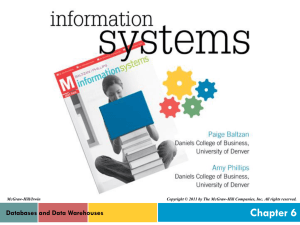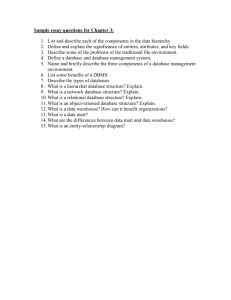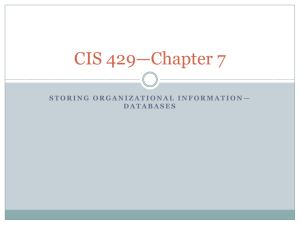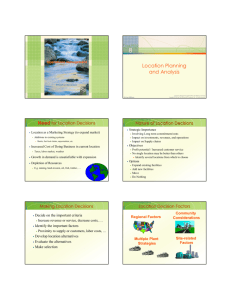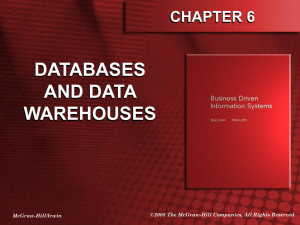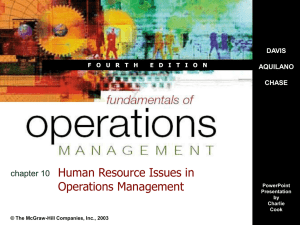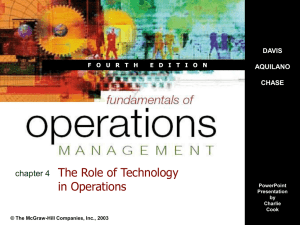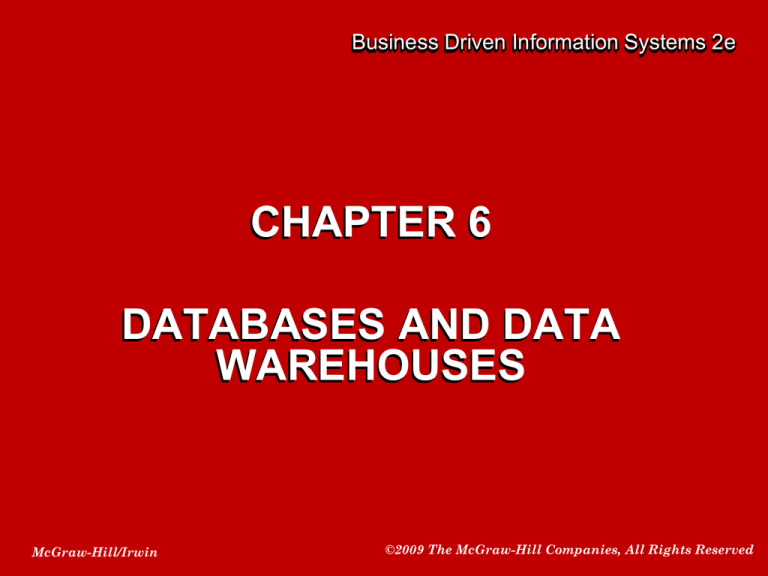
Business Driven Information Systems 2e
CHAPTER 6
DATABASES AND DATA
WAREHOUSES
McGraw-Hill/Irwin
©2009 The McGraw-Hill Companies, All Rights Reserved
SECTION 6.1
DATABASE
FUNDAMENTALS
McGraw-Hill/Irwin
©2009 The McGraw-Hill Companies, All Rights Reserved
6-3
Database Fundamentals
• Database – maintains information about
various types of objects (inventory),
events (transactions), people
(employees), and places (warehouses)
6-4
The Value of Transactional and
Analytical Information
6-5
The Value of Timely Information
• Timeliness is an aspect of information that
depends on the situation
– Real-time information – immediate, up-todate information
– Real-time system – provides real-time
information in response to query requests
6-6
The Value of Quality Information
• Characteristics of high-quality information
include:
– Accuracy
– Completeness
– Consistency
– Uniqueness
– Timeliness
6-7
Understanding the Costs of
Poor Information
• Potential business effects from low quality
information:
– Inability to accurately track customers
– Difficulty identifying valuable customers
– Inability to identify selling opportunities
– Marketing to nonexistent customers
– Difficulty tracking revenue
– Inability to build strong customer relationships
6-8
Relational Database Fundamentals
• Relational database model – stores
information in the form of logically related
two-dimensional tables
• Other DB Models
– Hierarchical database model
– Network database model
– Flat
– Object oriented
6-9
Entities and Attributes
• Entity – a person, place, thing, transaction, or
event about which information is stored
• Attribute (field, column) – characteristics or
properties of an entity class
6-10
Hierarchy of Data
6-11
Keys and Relationships
• Primary keys and foreign keys identify the
various entities in the database
– Primary key – a field (or group of fields) that
uniquely identifies a given record in a table
– Foreign key – a primary key of one table that
appears as an attribute in another table which
provide a logical relationship among the two
tables
6-12
• Potential
relational
database
for CocaCola
6-13
Database Concerns
• Scalability – refers to how well a system
can adapt to increased demands
• Performance – measures how quickly a
system performs a certain process or
transaction
6-14
Database Advantages
• Databases reduce information
redundancy
– Redundancy – the duplication of information
or storing the same information in multiple
places
• Inconsistency is one of the primary
problems with redundant information
6-15
Increase Information Integrity
(Quality)
• Information integrity – measures the
quality of information
• Integrity constraint – rules that help
ensure the quality of information
– Relational integrity constraint
– Business-critical integrity constraint
6-16
Database Management Systems
• Database management systems (DBMS) –
software through which users and application
programs interact with a database
6-17
Integrating Information
among Multiple Databases
• Building a central repository specifically
for integrated information
SECTION 6.2
DATA WAREHOUSE
FUNDAMENTALS
McGraw-Hill/Irwin
©2009 The McGraw-Hill Companies, All Rights Reserved
6-19
DATA WAREHOUSE FUNDAMENTALS
• Data warehouse – a logical collection of
information – gathered from many different
operational databases – that supports business
analysis activities and decision-making tasks
• Data mart – contains a subset of data
warehouse information
6-20
DATA WAREHOUSE FUNDAMENTALS
6-21
Information Cleansing or Scrubbing
• Standardizing Customer name from Operational Systems
6-22
Information Cleansing or Scrubbing
• Accurate and complete information
6-23
Data Mining and Business Intelligence
• Data mining – the process of analyzing data to
extract information not offered by the raw data
alone
• To perform data mining users need data-mining
tools
• Data-mining tools helps users uncover BI

